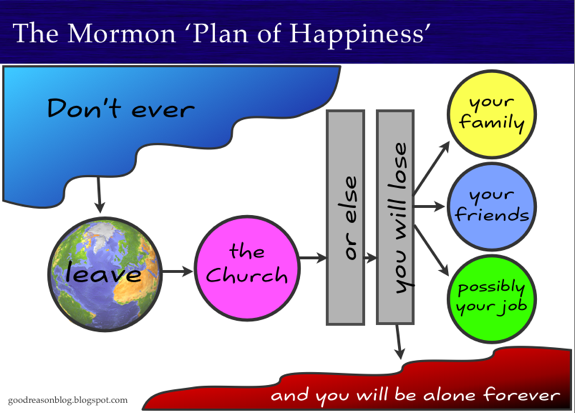I once described faith as “the willingness to suspend critical reasoning facilities in the service of a belief for which there is no adequate evidence”. Not everyone likes this definition (strangely), so I thought I’d return to the topic of faith and refine it a bit.
You might think it’s strange for an atheist to talk about faith in the first place. Perhaps you’d say I couldn’t give it a fair treatment, since I don’t have any. Which is a typical faith-y thing to say: you don’t really understand faith (or you’re not qualified to speak about it) unless you’ve fallen for it completely. You have to take the leap, and then you’ll get it. However, if ‘faith’ means ‘fooling yourself’, then a person of faith would be the worst person to ask about it. Anyway, humour me. Treat me as a somewhat objective observer. Have a little faith.
On the other hand, you may take exception to my claim that I don’t have any faith. Of course I do, you might say. It takes faith to do anything! It takes faith to be an atheist, I’ve been told. My Uncle Richard used to say that it takes faith to believe that the floor will be there when you get out of bed in the morning. It takes faith for scientists to study a cure for cancer, since they don’t know that they’ll be successful. It takes faith to believe in, say, evolution. So I’ve been told.
I don’t believe it. When people use this reasoning, they’re stretching the definition of faith to encompass everything, which intrudes on other concepts that we already have words for. Defining ‘faith’ this way makes the word meaningless.
The key insight to what faith is hinges on an understanding of its relationship to evidence, and it’s this: If you have evidence for something, you do not need faith in that thing. You just need to open your eyes. For this reason, I describe faith as belief without evidence.
The Book of Mormon agrees fairly well with this assessment. (It’s not a source I think much of, but some people do.) It says that once you know something, your faith becomes dormant.
32:17 Yea, there are many who do say: If thou wilt show unto us a sign from heaven, then we shall know of a surety; then we shall believe.
32:18 Now I ask, is this faith? Behold, I say unto you, Nay; for if a man knoweth a thing he hath no cause to believe, for he knoweth it.
Faith is only necessary in the absence of knowledge, according to this author. I’d agree. Insofar as evidence brings you knowledge of a thing, there is no need for faith in that thing where there is evidence for it.
So with that in mind, let’s go back to those who think that everything requires faith. Does it require faith to put your feet on the floor, believing it will be there? No. I have a lot of evidence that the floor has been there on previous mornings, and I can infer with some degree of certainty that this morning will be like other mornings. There’s a very high probability that the floor will be there, based on the evidence. (If tomorrow morning I turn out to be wrong and fall through the floor, I’ll update accordingly.) I may have a ‘belief’ that the floor will be there, but ‘belief’ is not the same as ‘faith’. I have a ‘belief’ that I am sitting at a computer writing this, but since this belief is well in evidence, I don’t need to exercise any faith in it.
Does a scientist need faith to work on a cure for cancer? No. A scientist may have a reasonable expectation of success, based on (again) evidence, but this is not the same as ‘faith’. Perhaps it would be more appropriate to describe this situation as ordinary ‘reasoning under uncertainty’, the kind we engage in every day. Or perhaps ‘hope’.
Do we need to have faith in scientific theories, like evolution? Not at all. You can ask a scientist what evidence led them to that conclusion, and they can tell you. Even better, you can replicate those results yourself, given time, equipment, and expertise. Of course, I haven’t actually replicated many scientific results myself. Do I therefore have faith in the scientists? No. It’s true that scientists typically function in what could be called a climate of ‘trust’, but this is optional. People in science can review each others’ results — no faith required.
What happens in faith is something like this: You don’t have evidence for something, but you wish it were true, so your faith makes up the difference and allows you to keep believing. It’s not knowing something, but believing it anyway. In other words, it’s wishful thinking.
Things that you have faith in may not always turn out to be wrong, but they’re likely to be, since it’s kind of hard to get things right. To get something right, you have to observe, generate ideas about what’s happening, control the natural tendency to see what we want to see, and figure out what it would take to prove your idea wrong. Even after you’ve gotten it mostly right, your idea might need to be refined, or overturned entirely if the evidence demands. That’s the cost of making reality your guide. But if you have faith, and you are unmoored from reality, you just keep believing whatever you want! Isn’t that easy?
Well, no. Having faith is not easy, especially when contrary evidence is staring you in the face. That’s when it takes a lot of tenacity to hold on to faith by sheer force of will. I can see why people would consider it a virtue, since it does take a lot of effort. I don’t think it’s a coincidence that people speak of ‘exercising’ faith.
But rather than exercise faith in things for which we lack adequate evidence, how much better it would be to find out the facts, and when facts are scarce, to keep an open mind. Faith needs to be thrown out, and where possible, to be replaced with knowledge.






Recent Comments